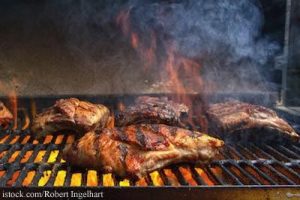If you’re firing up the grill this weekend, remember to put food safety first. The U.S. Department of Agriculture and the U.S. Food and Drug Administration both have good information for outdoor cooks. Here’s a summary of what they recommend.
 Are you going to marinate your meat? If so, do it in the fridge, not on the counter. Don’t re-use the marinade as sauce for the cooked meat. If you do want some for sauce, divide the marinade when you make it. Set aside some for sauce, use the rest for marinade.
Are you going to marinate your meat? If so, do it in the fridge, not on the counter. Don’t re-use the marinade as sauce for the cooked meat. If you do want some for sauce, divide the marinade when you make it. Set aside some for sauce, use the rest for marinade.
Do you plan to partially cook something to reduce grilling time? If you are, do this right before you are ready to put it on a hot grill. Otherwise, you are setting the stage for bacterial growth.
Use a food thermometer. This is the only way to tell when meat is cooked properly. Make sure it is in working order before the moment you need it. For battery-operated instant-read models, keep a spare battery on hand.
Cook meat to the following temperatures: fish and whole cuts of pork and beef including steaks, roasts and chops that are not mechanically tenderized and have not been scored should be cooked to 145˚ F. Mechanically tenderized or scored beef and pork, ground meat, and egg dishes should be cooked to 160˚F. All poultry, including whole birds; pieces, such as breasts and tenderloins; and ground turkey or chicken should be cooked to 165˚F.
Remember that raw meat and cooked meat always get their own separate dishes and utensils to protect your cooked meat from cross contamination. Keep a clean platter and serving utensils grillside so they are ready when you are. If you only have one set, wash them in hot, soapy water before putting the cooked meat on the platter. And enjoy grilling safely!




